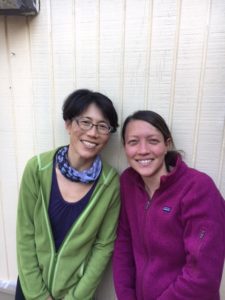

On a recent afternoon at the Aurora Learning Center, the preschoolers in the room were having a much easier time pronouncing Chinese words than their parents. And that, their parents seemed to understand, was the point.
Half a dozen kids (plus some baby siblings) had gathered for Mini NiHao, a new Chinese class for toddlers and preschoolers offered by Middlebury educator — and mom of four — May Poduschnick. The class is part of Middlingo, the language enrichment center she recently launched with Joanna Doria, a teacher at Ripton Elementary School and mom of two.
Poduschnick and Doria, who teaches Chinese to elementary-aged kids as part of Middlingo, are excited to develop this into an immersion or bilingual school offering language instruction in both English and Mandarin.
MiniBury caught up with the two women to learn a bit more about their philosophies and backgrounds.
MiniBury: What inspired you to start a language group for preschoolers?
May: I am an adamant proponent of foreign languages and expanding your horizons in cultural understanding. One of the most important steps is language acquisition. The earlier you are exposed to a foreign language, the better. It is truly a gift that a parent can give a child to teach them a foreign language.
Now, if you didn’t grow up with a second language, the next best thing is to find an opportunity for your children to learn. I have had friends asking me to teach their children Chinese. Others lament of the lack of opportunities to learn foreign languages until much later in school, and just the lack of language enrichment in a progressive town such as Middlebury.
I recognized that this was a good idea, but needed the motivation. The motivation came when my business partner and friend, Joanna, also supported the idea, and we decided to partner up to launch Middlingo.
Joanna: Before moving to Vermont, I taught Chinese for five years at a private middle school in Connecticut. While in Vermont, I searched for the best platform to continue my teaching but never really landed on the right fit. I was immediately onboard when May approached me about starting our own program.
Through the age of 7 or 8, children can learn to speak a second language with fluent grammar and without an accent. After that critical period, the ability to master a foreign language gradually declines. With that — and also our own young children — in mind, we decided to target this preschool and early elementary school age group.
MiniBury: Describe the basic format of the class.
Joanna: Depending on the age group, our classes run from 45 minutes to 1.5 hours. The most important component is making the class fun so that the kids enjoy it and want to keep learning more. We sing songs in Chinese, we play games to remember vocabulary, we learn Chinese characters, and we focus on listening and speaking.
MiniBury: Tell us about your backgrounds.
May: I was born in Taipei, Taiwan, but grew up in Southern California, in a Chinese-speaking home. My parents made a point to always speak to my brother and me in Chinese, and for that I am eternally grateful. They also sent us to Saturday Chinese school for years to learn Chinese characters and history, which was helpful, too (although I didn’t think so at the time).
When I was growing up, it was NOT cool to speak any other language besides English. The only people that actually used another language besides English in public were those that couldn’t speak English, and no one wanted to come across as foreign. (Ever heard of FOB, fresh off the boat? That was the term used for Asians just arriving across the Pacific Ocean.) But my parents still engrained in my mind that I am Chinese AND American and thus I should be aware of both cultures.
I believe that times have changed, and Americans see the value of learning a foreign language. In most circles, it is actually desirable to speak another language, pretty cool if you can speak a few (although I still don’t think it is favorable to speak English with an accent of any sort). Thus immersion schools and bilingual schools are popping up in cities across the country.
Joanna: Although I was born in the states, my first language was Chinese. I spoke at home with my mother who grew up in Taiwan. Years ago, people believed that learning a second language would confuse a child. So, when I started elementary school, I stopped speaking at home. Now, research shows that learning a second language actually promotes brain development.
MiniBury: What are the benefits of learning a language at a young age?
May: Language acquisition is effortful, but the earlier you start, the less it feels like work. Teaching a baby or toddler a foreign language is a matter of repetition, not grammar rules and subject, nouns, verbs, conjugations and so forth. And as people say, kids’ brains are like sponges — they can soak up so much knowledge and actually not get it all confused.
For more information on Middlingo, visit: www.middlingo.com
To learn about the Middlingo summer camp, visit: www.auroralearningcentervt.org

Thank you very much for sharing this information! This is the only language program that I know of in Middlebury for kids. Thanks!!!